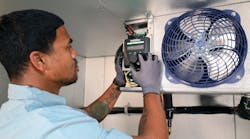The transformation of the commercial refrigeration industry continues. Here, ContractingBusiness.com and Supermarket News magazines continue a series of articles based on our Second Annual Refrigeration Roundtable discussions, by refrigeration contractors and supermarket executives. Part 2: Technician Training & Recruitment
Have you ever lost a quality technician to a competitor for 50 cents an hour? Have you been thwarted in efforts to recruit technology-savvy young people into the “greasy” world of refrigeration? You’re not alone.
At the second annual Contracting Business.com/Supermarket News “Refrigeration Roundtable” — held during 2011 Mechanical Systems Week in Indianapolis, IN, Sept. 21-23 — our contractor and super- market executive panelists discussed the most pressing issue facing the entire industry: recruiting and retaining a new supply of young technicians who want to build careers in HVACR.
Higher Pay, Improved Image
We began by asking, Why is it harder to find new talent for the refrigeration industry than in years past? Our panelists went right to the point: it has to do with the quality of career candidates are seeking, and everyone’s favorite kind of “green” — compensation.
“Since the last of the trade schools in the Northeast failed, the quality of technicians has continued to decline rather than rise with technology advancements,” began Steve Hagen, procurement and engineering director, Fresh & Easy Neighborhood Market. The reason? Low pay, he said.
“The hourly wages and the amount refrigeration contractors charge customers isn’t comparable to the rest of the industry, such as air conditioning technicians or electricians.
“Normally, competition drives the market, and the compensation package improves as competitive forces impact the market. It doesn’t seem to have happened as directly with refrigeration as it has in other fields. It might be related to supermarkets not recognizing the value of high quality, competent technicians, and the effect on their business when they don’t have them. We need to sell the technology aspect of the career, as well as make sure we don’t expect too many hours from the technicians. This is a difficult balancing act,” Hagen said.
George Ronn, senior manager, refrigeration compliance and system controls, SUPERVALU, disagreed that the issue is related to compensation. He said he’s seen young people turn down high wages because they just don’t like the work. In response to this harsh reality, he said the industry must modernize the career.
“We need to make this job more glitzy and appealing to young people,” Ronn said. “Four of our in-house maintenance divisions are in large metropolitan areas. We pay union scale in those cities, and we still can’t get new people. You can come in making $75,000 to $100,000 a year, right out of the box in those cities. But, they’d rather take a $40,000 per year computer programming job. It has to do with the ‘greasy’ image associated with refrigeration.”
Russ Dudan, CEO, Advantage Refrigeration, agreed. Because “high-tech” is so accessible, it’s where everyone wants to be.
“People starting out don’t want to get involved with mechanical systems,” Dudan said, “they want electronics. You can sell them on that. In addition, technicians who have been in the trades for a while understand the need for the 3 a.m. emergency call. They understand that it’s their job, and they take the responsibility for it. Not the younger group.”
Jerry Stutler, vice president, construction and facility engineering, Sprouts Farmers Market, said less-qualified technicians cost more, using some relevant and related questions as examples.
“Do they get the job done in two, three, or four hours on the first call, or do they work on it for six hours, and then have to call in a second guy for help? And are cases shut down all this time, so that we didn’t have product to sell? I’m willing to pay more to get the job done right the first time. Absolutely,” he said.
“The big questions,” Stutler added, “are, where do you find qualified technicians, and how do you keep them once they’ve been well-trained? What’s going to stop someone from snatching a kid up after he’s been fully-trained, at 50 cents an hour more?”
Stutler suggested an approach based on the U.S. military as a possible way to increase loyalty.
“The military essentially hires on a contract basis. A man enlists, and the military spends a lot of money on training him. He’s going to stay there for four years. Technicians would sign a contract that says once we’ve trained you must agree to stay with us for so many years, after which you will receive a bonus.
“What will they gain from that? They’ll gain a great education with a company that has a great training program, receive four or five years of great experience, and will be marketable.”
Stutler claimed that young technician candidates are primed to learn new technology. “They don’t want to pull a wrench,” he said. “They’re the people we have to attract, through good benefits and compensation programs.”
Contractor Neil Lansing, president, Fournier, Jacksonville, FL, said he finds objection to 24/7 on-call schedules, an industry service essential.
“Young kids come in and say that they’re not doing 24/7,” Lansing said.
Train to Retain
Our panelists agreed that training works wonders in retaining established, veteran technicians, who have outgrown the wanderlust and impetuous nature of younger techs. It keeps them up-to-date, gives them something to aspire to, and maintains high levels of service quality.
“Advantage Refrigeration has incorporated in-house training to retain technicians and to ensure they’re all at the same level of quality,” explained Richard Adkins, director of marketing. “We’re also involved in new technologies, and bringing in manufacturers to provide training. The manufacturers are providing very good training platforms, and explaining installation procedures. Some manufacturers also provide certifications following the training.”
Page 2 of 2
Adkins says concentrated training from the manufacturer is one of the refrigeration industry’s inescapable and welcome evolutions, brought on by technological advancements.
“Refrigeration had a benchmark for so many years, without much change. In the last five years, we’ve seen such a great amount of change, and we’ll see a lot more in the next five. It’s going to require a focus by more manufacturers to institute training programs,” he said, and added that older field team members appreciate exposure to new ideas.
At Fournier, Neil Lansing has instituted a color-coded system of training and advancement. The technicians’ goal is to obtain a “blue shirt,” which signifies highest proficiency. In a twist, even a new but experienced Fournier technician has to don a green shirt. “No matter who you are, or what your experience level is, you come into the company as a ‘green shirt’ helper. You have to do certain things to earn a red shirt, which gets you into burners, case settings, things of that nature,” he explained. “Once you graduate from a red shirt, you move to blue, which is the point at which you can start running a crew and projects. The program includes skill assessments and a graduated pay scale.”
Bryan Beitler, vice president/chief engineer, Source Refrigeration & HVAC, says the company has made significant investments in training. They budget 40 hours of training per tech, per year, and retention rates have been improved.
“Keep your training current,” Beitler advised. “We’re doing our best to try to beat the new technology in the field, and that’s really a chore, to equip these guys with what they need before they get there and have to work on it. Our goal is to send the right technician for the specific customer situation, every time. Our training is the backbone to this approach.”
Gary Cooper, director of refrigeration, Lowe’s Markets, combines new systems training and basic rack assembly guidance for store technicians.
“While we implement the latest technologies available — such as electronic evaporator pressurizing valves (EEPRs), Emerson Copeland Intelligent Store Discus (ISD) 2.0, and Copeland Discus Digital compressors in the rack systems we build, we also deal with a lot of basic single unit systems.
“Our service techs are involved in the building of these racks and units from the frame up. We’ve found that goes a long way in helping them understand that a parallel rack or a single unit are comprised of the same basic components and follow the same principles,” Cooper said.
Sam Cantrell, mechanical engineer, Raley’s, says the California refrigeration industry is faced with a different situation: an excess amount of workers chasing too few openings.
“I think the technician problem started during the construction boom. We had all of these great technicians moving up the ladder faster than the apprentice programs could replenish them,” Cantrell shared. “You had great installers and service techs who were becoming supervisors and project managers, and the people that were filling in after them weren’t prepared for it, or they were branching out, starting their own companies.
“Then, the recession hit. And you don’t get guys that have desk jobs all of a sudden coming back into the field, even though they may have been more skilled.”
Cantrell suggested that working to improve the knowledge base of existing technicians, isn’t necessarily an easy task.
“It’s going to be much harder for those guys that have been doing this for so long to reprogram and start thinking more digitally,” he said.
Bryan Beitler said Source’s in-house training takes technicians from entry-level to upper-level skills.
“It’s key, in order for the technicians to understand where they can be, and what it takes to get there. You map out their compensation levels and establish goals, so that they can see a clear career path. It takes a commitment,” he said. Some of Beitler’s efforts relate to partnerships with trade and technical schools.
“We’re bringing trade school students into our training center, and giving them exposure to what they might find in the field. We evaluate them and look at their current skills. That’s a possible avenue for creating early interest among good, young potential technicians, and a good recruiting ground for Source,” Beitler said.
Start 'Yesterday'
Refrigeration contractors who foresee a need for new technicians must develop a modern recruitment strategy. Employing some of these methods will require time, which makes it all the more important to find new ideas today. Make a realistic assessment of your existing training and recruiting programs, and implement improvements as soon as possible. There are many resources at your disposal — industry colleagues, employment consultants, online training, and in-house ”universities” —that will find and train technicians your way, the right way.
Our 2011 Refrigeration Roundtable Panelists
Sam Cantrell, mechanical engineer, Raley’s, Sacramento, CA
Gary Cooper, director of refrigeration, Lowe’s Markets, Lubbock, TX
Steve Hagen, procurement and engineering director, Fresh & Easy Neighborhood Market, El Segundo, CA
George Ronn, senior manager, refrigeration compliance and system controls, SUPERVALU, Minneapolis, MN
Jerry Stutler, vice president of construction and facility engineering, Sprouts Farmers Market, Phoenix, AZ
Richard Adkins, director of marketing, Advantage Refrigeration, New Berlin, WI
Bill Almquist, president, Almcoe Refrigeration, Dallas, TX
Bryan Beitler, vice president/chief engineer, Source Refrieration, Anaheim, CA
Russ Dudan, CEO, Advantage Refrigeration, New Berlin, WI
Neil Lansing, president, Fournier, Jacksonville, FL
Sponsor representatives:
Dave Smith, systems specialist, Hill PHOENIX
Tom McFarlane, West Coast sales manager, Hill PHOENIX.
Frank Schwieterman, retail technical support manager, Emerson Climate Technologies, Inc.
Tim Uderman, contractor support manager, Emerson Climate Technologies, Inc.
The Bottom Line
"I graduated from Skyline High School in Dallas in 1972. At that time, Skyline was the world leader in trade schools, combining academics and vocational education. I visited the school recently, to talk to the air conditioning class. I waxed eloquent for an hour and a half, on controls, refrigerants, types of systems, you name it. The first question from a student was, 'How much are you going to pay me?'"
"We've got to address the pay issue, contractors and customers together, because it's our problem. I don't know what needs to happen first, but we need to start now." — Bill Almquist, Almcoe Refrigeration















